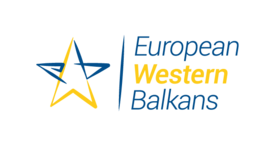European Western Balkans
European Western Balkans (sometimes abbreviated EWB) is a web portal that focuses on the Western Balkans countries and reports on development of the European Union's enlargement policy towards the states of North Macedonia, Montenegro, Serbia, Albania, Bosnia and Herzegovina and Kosovo[a].
 | |
| Type | News Website |
|---|---|
| Owner(s) | Centre for Contemporary Politics |
| Founder(s) | Nemanja Todorović Štiplija, Nikola S. Ristić, Artan Murati |
| Editor-in-chief | Nemanja Todorović Štiplija |
| Deputy editor | Nikola Burazer |
| Founded | May 21, 2014 |
| Language | English, Serbian |
| Headquarters | Belgrade, Serbia |
| Country | Serbia |
| Website | www europeanwesternbalkans |
| Free online archives | Yes |
| |
The objective of European Western Balkans is to enhance understanding, raise awareness and further dialogue surrounding issues facing the democratization of Balkan nations and the desire for its integration in the European Union. European Western Balkans website takes a more journalistic than scholarly approach with interviews and analysis from journalists, experts, analysts, writers, historians, as well as leaders and political figures from the European Union and Western Balkan states.[1]
European Western Balkans is entirely independent and it is owned and run Centre for Contemporary Politics, think tank based in Belgrade. In 2016 portal together with its parent organization and Konrad Adenauer Foundation published a guide in Serbian language "Evropski parlament i Srbija" (European Parliament and Serbia) with the aim of helping Serbian MP's understanding how European Parliament works. The promotion of the guide took place in National Assembly of Serbia and the speakers were David McAlister and Maja Gojković. [2][3]
Interviews and Op-Eds
European Western Balkans has a series of interviews with key people from Western Balkans countries which are involved in European integration process of their countries and interviews with politicians and specialists in a wide range of fields especially in European Politics and European integration.[4] Some of the notable interviews include: Sebastian Kurz, David McAllister, Johannes Hahn, Axel Dittmann, Hannes Swoboda, Eduard Kukan, Hashim Thaçi, Jadranka Joksimović, Klajda Gjosha, Jean-Eric Paquet, Gunther Krichbaum, Nikola Dimitrov, Goran Svilanović, Vesna Pusić, Majlinda Bregu, Francis Fukuyama.
Besides interview sections, site has a section containing op-eds of various EU related individuals such as: Igor Vidović, Ivan D. Leković, Titus Corlățean, Titus Corlățean, Duško Lopandić, Ulrike Lunacek, Bekim Çollaku, Tanja Fajon, Sir Robert Cooper, Anneliese Dodds, Marko Đurić, Ditmir Bushati, Lubomír Zaorálek, Florian Bieber, Violeta Bulc, Miroslav Lajčák.
EWB Events
Together with their partners (on the first place the Balkan Trust for Democracy and the European Fund for the Balkans), European Western Balkans organized a series of events, round tables, public discussions and conferences. The main speakers of these events among others were: Francis Fukuyama, Michael Carpenter, Florian Bieber, James Ker-Lindsay, Nikola Dimitrov, Johannes Hahn, Christian Danielsson, etc.
European Western Balkans - Srbija
In April 2017, European Western Balkans - Srbija started to work.[5] New web portal, in Serbian language, is focused mainly on European integration of Republic of Serbia, following negotiations of chapters of Community acquis.[6]
Balkanoscope
On 26 March 2018 a new project called "Balkanoscope" was presented in Brussels. It is a joint initiative of EWB and European Fund for the Balkans.[7] Aim of the project is to "present the Balkans from a different viewpoint...where real people are struggling with real issues" by publishing different stories and interviews.[8]
As of 7 August 2018 there are English and French version of the portal.
Notes
^ Kosovo is the subject of a territorial dispute between the Republic of Kosovo and the Republic of Serbia. The Republic of Kosovo unilaterally declared independence on 17 February 2008, but Serbia continues to claim it as part of its own sovereign territory. The two governments began to normalise relations in 2013, as part of the 2013 Brussels Agreement. Kosovo is currently recognized as an independent state by 97 out of the 193 United Nations member states. In total, 112 UN member states recognized Kosovo at some point, of which 15 later withdrew their recognition.
References
- "About European Western Balkans". European Western Balkans. Retrieved June 22, 2016.
- "Vodič o Evropskom parlamentu za srpske parlamentarce". N1 Srbija (in Serbian). Retrieved September 5, 2018.
- "EVROPSKI PARLAMENT I SRBIJA: Vodič za stabilnu vožnju na putu ka EU predstavljen u Beogradu". kurir.rs (in Serbian). Retrieved September 5, 2018.
- "Portfolio". European Western Balkans. Archived from the original on August 16, 2016. Retrieved June 22, 2016.
- "European Western Balkans od danas i na srpskom jeziku". Radiotelevizija Vojvodine. Retrieved March 25, 2018.
- Nenadović, Aleksandra. "European Western Balkans od sada i na srpskom jeziku". Glas Amerike (in Serbian). Retrieved June 25, 2018.
- "Sutra u Briselu "Balkanoskop – priče o Balkanu u prvom licu" | Srpska dijaspora | Vesti iz dijaspore i o dijaspori". www.srpskadijaspora.info (in Serbian). Retrieved August 7, 2018.
- EWB (March 27, 2018). "Balkanoscope presented in Brussels - European Western Balkans". European Western Balkans. Retrieved August 7, 2018.